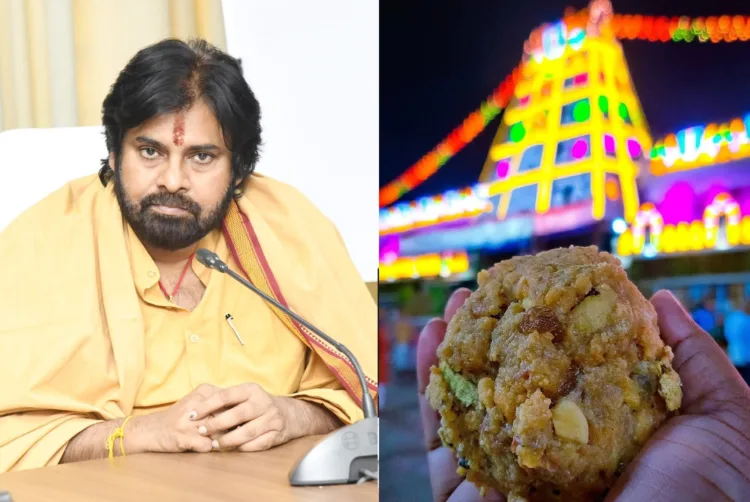HYDERABAD: In a significant move, Andhra Pradesh Deputy Chief Minister Pawan Kalyan has vowed to undertake an 11-day Deeksha as an act of repentance for not detecting the adulteration of Tirumala Laddu prasadam earlier. The sacred prasadam, revered for its purity, was reportedly desecrated with animal residues due to the corrupt practices of past rulers. Kalyan described the contamination as a grave sin committed by individuals with vile intentions, calling it a stain on the Hindu community for failing to identify it sooner.
In an emotional statement on ‘X’ Andhra Pradesh Deputy Chief Minister Pawan Kalyan voiced his anguish over the Tirumala Laddu prasadam adulteration.
ఏడుకొండలవాడా..! క్షమించు
•11 రోజులపాటు ప్రాయశ్చిత్త దీక్ష
అమృతతుల్యంగా… పరమ పవిత్రంగా భావించే తిరుమల లడ్డు ప్రసాదం- గత పాలకులు వికృత పోకడల ఫలితంగా అపవిత్రమైంది. జంతు అవశేషాలతో మాలిన్యమైంది. విశృంఖల మనస్కులే ఇటువంటి పాపానికి ఒడిగట్టగలరు. ఈ పాపాన్ని ఆదిలోనే పసిగట్టలేకపోవడం…— Pawan Kalyan (@PawanKalyan) September 21, 2024
“The Tirumala Laddu prasadam, regarded as a symbol of purity, has been defiled due to the corrupt practices of previous rulers. It has been contaminated with animal residues—an unholy act that only those with vile intentions could commit,” Kalyan wrote.
Expressing his personal guilt for not uncovering the issue sooner, Kalyan continued, “The moment I learned that animal residues were found in the prasadam, my heart was troubled. I felt overwhelmed with guilt. As someone who has been fighting for public welfare, it pained me that I didn’t realize this atrocity earlier.”
He announced his decision to atone for this grave offense against Lord Balaji, saying, “Every believer in Sanatana Dharma must repent for this grievous insult to the deity of Kali Yuga. As part of that repentance, I have resolved to undertake a vow of penance. On September 22, 2024, I will begin an 11-day Deeksha at the Sri Dasavatara Venkateswara Swami Temple in Namburu, Guntur district.”
Pawan Kalyan concluded his emotional post by emphasizing the spiritual importance of his vow: “After my penance, I will visit Lord Venkateswara at Tirumala and pray, ‘Oh Lord of Lords… give me the strength to cleanse the sins committed by the past rulers against you.'”
In a pointed critique of the Tirumala Tirupati Devasthanams (TTD) board, Kalyan remarked, “What troubles me most is that even the members of the TTD board and employees failed to detect these grave errors. Even if they did, they remained silent. Were they afraid of those demonic rulers at the time?”
His post ended with a rallying call to restore Dharma: “The actions of these past rulers, who tarnished the purity of Tirumala, have deeply hurt every follower of Hindu Dharma. The time has come to take steps toward restoring Dharma and preserving the sanctity of our sacred traditions.”
Kalyan’s statements on X have sparked intense discussions among his followers, with many supporting his commitment to atonement and calling for accountability from those responsible for the scandal.
In his latest series of statements, Pawan Kalyan has called for a larger national debate on safeguarding Hindu temples and traditions. He emphasized the need for a structured approach to protect Sanatana Dharma and temple practices across India.
We are all deeply disturbed with the findings of animal fat (fish oil,pork fat and beef fat )mixed in Tirupathi Balaji Prasad. Many questions to be answered by the TTD board constituted by YCP Govt then. Our Govt is committed to take stringent action possible.
But,this throws… https://t.co/SA4DCPZDHy— Pawan Kalyan (@PawanKalyan) September 20, 2024
“Maybe the time has come to constitute a ‘Sanatana Dharma Rakshana Board’ at a national level to look into all the issues related to temples across Bharat,” Kalyan suggested, inviting nationwide attention to the management and preservation of religious institutions.
He further stressed, “A debate has to happen at a national level, involving all policy makers, religious heads, judiciary, citizens, media, and others in their respective domains.” Kalyan believes that this collective dialogue is essential for addressing the challenges faced by Hindu temples and preserving their sanctity for future generations.



















Comments